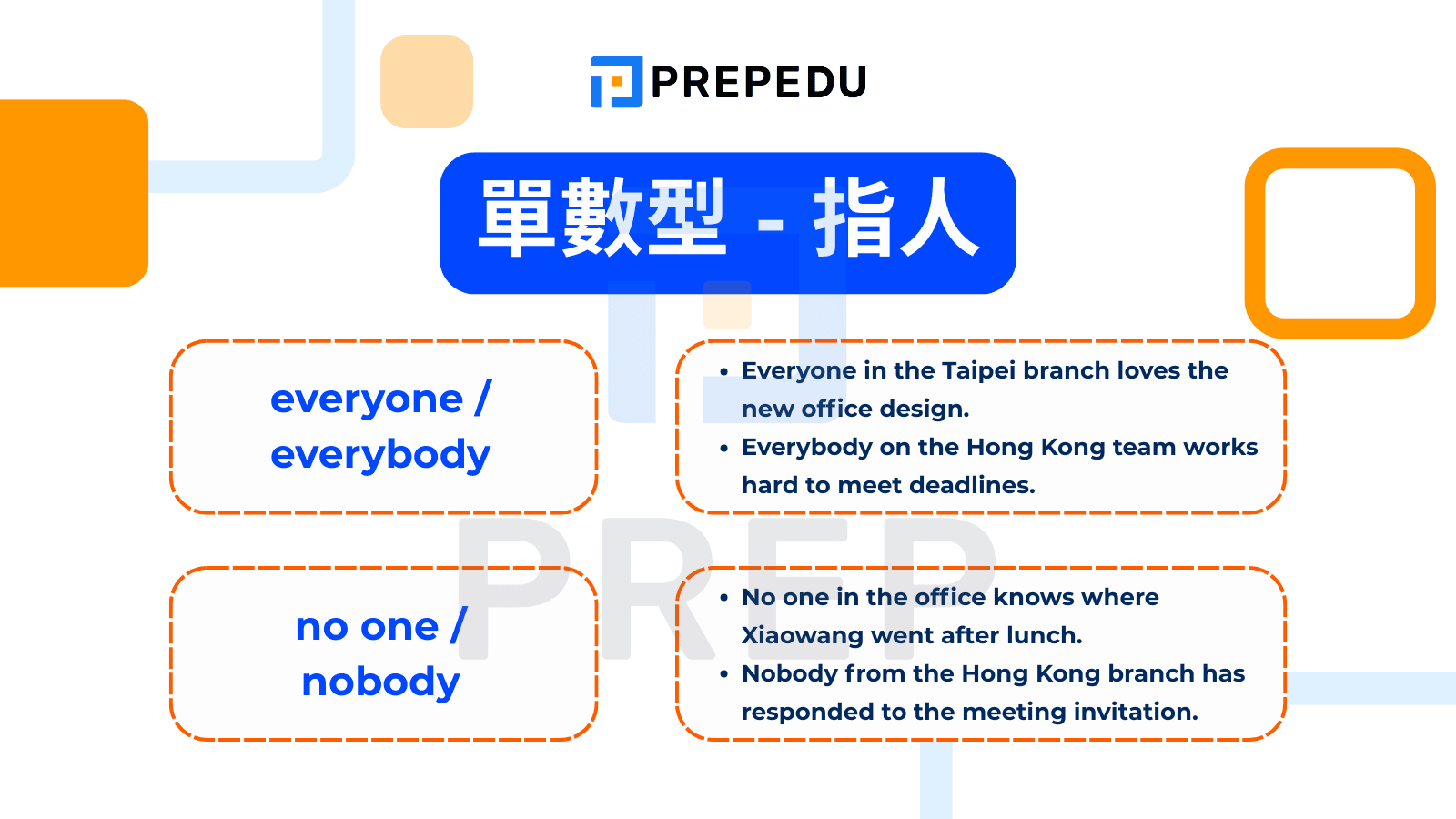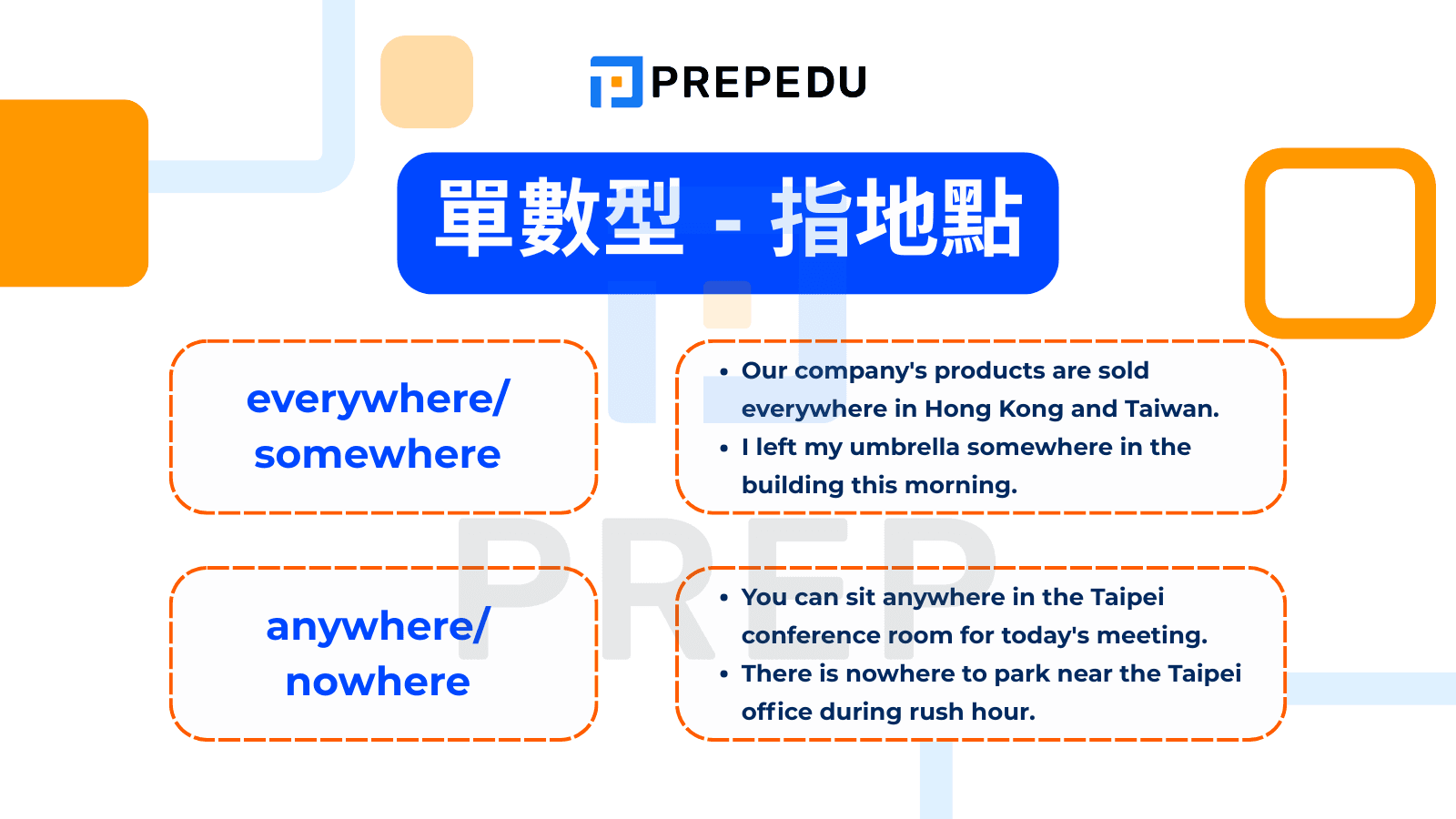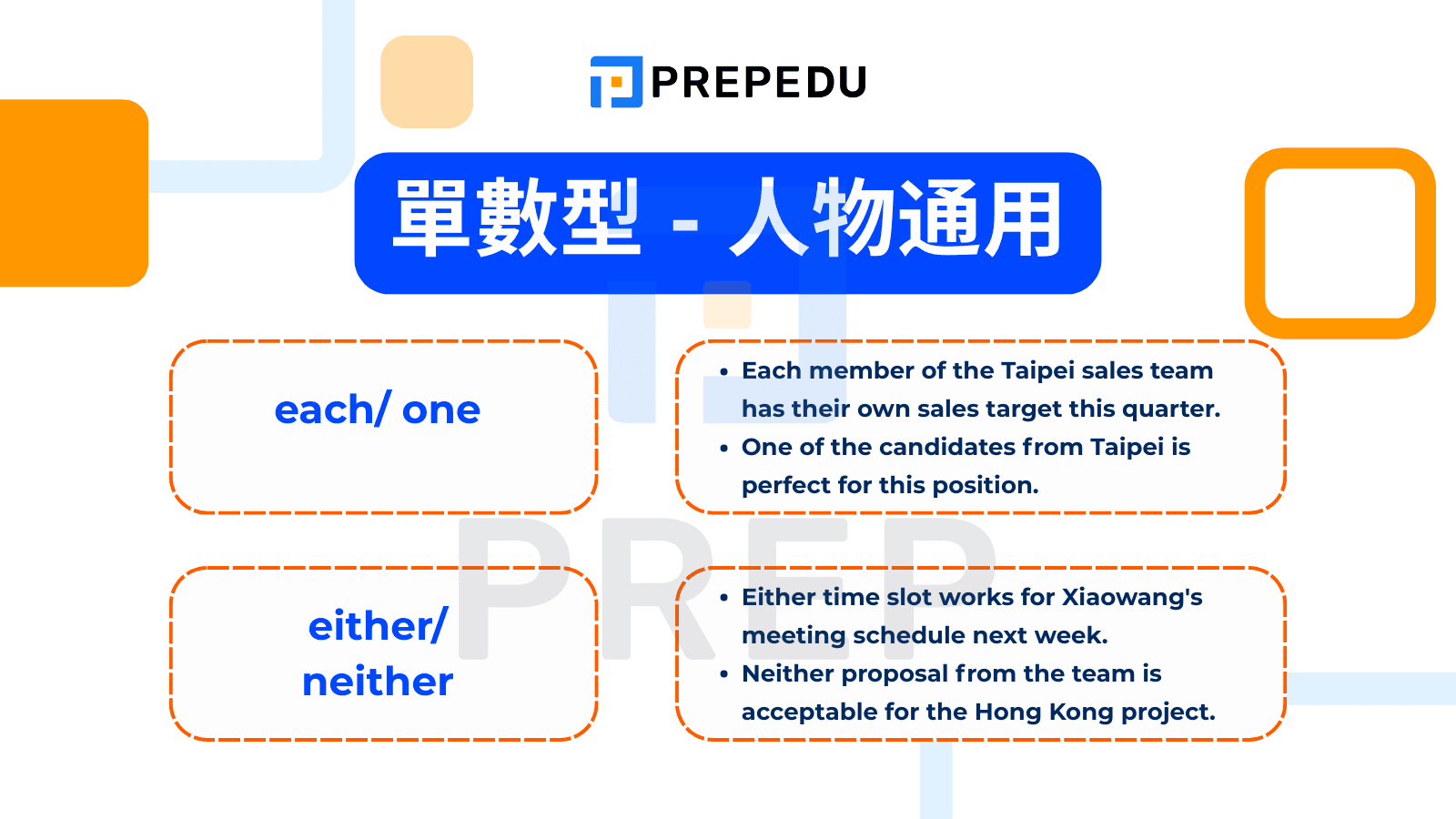英文不定代名詞(Indefinite Pronouns):Someone/ Everyone/ Anything 等用法分類,句中位置,核心規則
什麼是不定代名詞?不定代名詞英文為 Indefinite Pronouns,是指「不明確指出特定人,物或地點」的代名詞,例如 Someone(某人),Anything(任何事物),Everywhere(到處)等。這類詞彙在英文句子中扮演關鍵角色,讓我們能在不知道或不需要明說具體對象時,依然清楚表達意思。許多學習者經常困惑:「不定代名詞有哪些?」,「Other Another The other 怎麼分?」,「Anything 可數嗎?」這些問題正是學習不定代名詞時最常遇到的挑戰。
不定代名詞涵蓋範圍廣泛,從最基礎的 everyone,nothing,到進階的 one / another / the other 區辨,每個環節都有其獨特的文法規則。根據統計,不定代名詞在日常英文對話中的使用頻率高達 15%,掌握其正確用法能大幅提升英文溝通能力。
本文由 PREPEDU 專業教學團隊精心整理,將帶你深入了解不定代名詞的完整分類,句中位置,五大核心用法規則,並提供 30 題實戰練習題含詳解,讓你從基礎到進階全面掌握這個重要文法主題,為 IELTS,TOEIC 等英語考試打下堅實基礎。

I. 英文不定代名詞是什麼?
不定代名詞為 Indefinite Pronouns,指的是「不明確指出特定人,物或地點」的代名詞英文。與定代名詞(如 The,It)不同,不定代名詞用於泛指某個或某些不確定的對象,讓我們能在不知道或不需要明說具體對象時,依然清楚表達意思。
核心概念對比:
|
類型 |
說明 |
範例 |
|
定代名詞 (Definite) |
指特定明確的對象 |
The book is interesting.(那本書很有趣。)← 指特定那本書 |
|
不定代名詞 (Indefinite) |
泛指不特定的對象 |
Someone called you.(有人打電話給你。)← 某個不特定的人 |
不定代名詞讓我們能在不知道或不需要明說具體對象時,依然能清楚表達意思。理解「不定代名詞有哪些?」是掌握這個文法主題的第一步,接下來我們將探討不定代名詞的分類,位置與運作方式。
II. 不定代名詞英文在句中的三大位置
不定代名詞如同一般名詞英文,可在句中擔任不同文法角色。理解其句法位置,是靈活運用不定代名詞的關鍵基礎。
1. 不定代名詞作為主詞(Subject)
不定代名詞可置於句首作主詞,決定動詞的單複數形式。這是最常見的不定代名詞使用方式。
結構:
不定代名詞 + 動詞英文 + 其他成分
範例:
-
Everyone in the Taipei office is attending the quarterly meeting today.(臺北辦公室的每個人今天都在參加季度會議。)
-
Both of my colleagues from Hong Kong are joining us for dinner tonight.(我兩位來自香港的同事今晚都會跟我們一起吃飯。)
重點提醒: 複合不定代名詞(-one/-body/-thing 結尾)永遠接單數動詞,這是不定代名詞文法中最重要的規則之一。
2. 不定代名詞作為受詞(Object)
不定代名詞可接在動詞後作受詞,表達行為的對象。
結構:
主詞 + 動詞 + 不定代名詞
範例:
-
Xiaowang wants to buy something special for his mother's birthday at the department store.(小王想在百貨公司為母親的生日買點特別的東西。)
-
The HR manager in Taipei didn't tell anyone about the interview results yet.(臺北的人資經理還沒告訴任何人面試結果。)
3. 不定代名詞作為介系詞受詞(Object of Preposition)
結構:
介系詞 + 不定代名詞
範例:
-
The project manager from Hong Kong doesn't listen to others when making decisions.(來自香港的專案經理在做決定時不聽取他人意見。)
-
Xiaowang gave the presentation materials to someone in the conference room this morning.(小王今天早上把簡報資料給了會議室裡的某個人。)

III. 總整理:不定代名詞有哪些?
不定代名詞依據「所指對象」與「數量概念」可細分為多個類別。以下提供完整分類與用法說明,協助你徹底理解「不定代名詞有哪些?」這個重要問題。
1. 單數型 - 指人(Singular - Person)
這類不定代名詞專指人,永遠接單數動詞。
|
不定代名詞 |
意思 |
範例 |
|
everyone / everybody |
每個人 |
|
|
someone / somebody |
某人 |
|
|
anyone / anybody |
任何人 |
|
|
no one / nobody |
沒有人 |
|
用法提醒: 所有格形式可加 's,如 someone's phone(某人的手機),everybody's responsibility(每個人的責任)。

2. 單數型 - 指物(Singular - Thing)
這類不定代名詞專指事物,同樣接單數動詞。
|
不定代名詞 |
意思 |
範例 |
|
everything |
每件事/一切 |
|
|
something |
某件事/某物 |
|
|
anything |
任何事物 |
|
|
nothing |
沒有事物 |
|
重要觀念: Anything 可數嗎?答案是「不可數概念」。雖然 Anything 本身是代名詞,但它代表的是「任何事物」這個抽象概念,因此永遠接單數動詞。

3. 單數型 - 指地點(Singular - Place)
這類不定代名詞專指地點,是許多學習者容易忽略的重要類別。
|
不定代名詞 |
意思 |
範例 |
|
everywhere |
到處/每個地方 |
|
|
somewhere |
某處 |
|
|
anywhere |
任何地方 |
|
|
nowhere |
無處 |
|

4. 單數型 - 人物通用(Singular - Both)
這類不定代名詞既可指人也可指物,使用範圍更廣泛。
|
不定代名詞 |
意思 |
範例 |
|
each |
每一個 |
|
|
one |
一個 |
|
|
another |
另一個 |
|
|
either |
兩者之一 |
|
|
neither |
兩者皆非 |
|

5. 複數型與數量詞(Plural & Quantity)
永遠複數:
|
不定代名詞 |
意思 |
範例 |
|
both |
兩者都 |
|
|
few |
少數幾個 |
|
|
many |
許多 |
|
|
several |
幾個 |
|
|
others |
其他人/物 |
|
可單可複(SANAM 原則):
這五個不定代名詞依後接名詞的可數性決定動詞單複數,是「不定代名詞可數?」問題的關鍵答案。
|
不定代名詞 |
接可數名詞(複數動詞) |
|
Some |
|
|
Any |
|
|
None |
|
|
All |
|
|
Most |
|

IV. 不定代名詞的五大核心用法規則
掌握以下不定代名詞規則,能避開常見錯誤,讓你的英文更道地專業。
1. 規則一:主詞與動詞一致性
複合不定代名詞(-one/-body/-thing/-where 結尾)必用單數動詞。
結構:
不定代名詞(單數)+ 單數動詞
|
正確用法 |
錯誤示範 |
|
Everyone in the Taipei office is excited about the upcoming company trip.(臺北辦公室的每個人都對即將到來的公司旅遊感到興奮。) |
Everyone in the Taipei office are excited ❌ |
|
Something has been left in the Hong Kong conference room overnight.(有東西在香港會議室過夜了。) |
Something have been left ❌ |
記憶口訣: 看到 -one/-body/-thing/-where 結尾,動詞就用單數形。
可參考以下文章中的主詞與動詞一致性規則:主詞動詞一致性完整指南:規則、常見錯誤與實戰練習
2. 規則二:形容詞後位修飾
當形容詞修飾不定代名詞時,必須放在不定代名詞之後,這是英文不定代名詞的特殊語序規則。
結構:
不定代名詞 + 形容詞
|
正確用法 |
錯誤示範 |
|
Xiaowang wants to buy something special for his parents' anniversary in Taipei.(小王想為父母在臺北的週年紀念日買點特別的東西。) |
Xiaowang wants to buy special something ❌ |
|
We need someone reliable to manage the Hong Kong branch office.(我們需要可靠的人來管理香港分公司。) |
We need reliable someone ❌ |
原因: 不定代名詞的形容詞修飾採「後置修飾」(Postpositive Adjective)結構,這是英文中少數幾種形容詞後置的情況。
3. 規則三:所有格形式
不定代名詞在表示所有權時,其形式依指人或指物而有所不同。以下用清楚的表格說明如何表達「某人的」或「某物的」。
指人的所有格:在不定代名詞後面加 's → 這個規則就像一般名詞的所有格一樣,在字尾加上「撇號 s」('s)。
|
不定代名詞 |
所有格形式 |
範例句 |
說明 |
|
someone |
someone's |
Someone's briefcase has been left in the Taipei meeting room.(有人的公事包留在臺北會議室了。) |
someone's = 某人的公事包 |
|
anyone |
anyone's |
Is this anyone's phone on the Hong Kong office desk?(這是辦公桌上某人的手機嗎?) |
anyone's = 任何人的手機 |
|
nobody |
nobody's |
This is nobody's fault; it was just an unfortunate accident.(這不是任何人的錯;只是不幸的意外。) |
nobody's = 沒有人的錯 |
|
everyone |
everyone's |
Everyone's opinion matters in our Taipei team meeting.(在我們臺北團隊會議中,每個人的意見都很重要。) |
everyone's = 每個人的意見 |
指物的所有格:通常使用 of 結構 → 當不定代名詞指物時,較少使用 's,而是用「of + 不定代名詞」的結構。
範例句:
-
The importance of everything discussed today cannot be overstated.(今天討論的所有事情的重要性怎麼強調都不為過。)➡️ of everything = 所有事情的
-
The value of something lies in its usefulness to Xiaowang's project.(某物的價值在於它對小王專案的實用性。)➡️ of something = 某物的
快速判別法:
-
指「人」→ 不定代名詞 + 's(someone's coat 某人的外套)
-
指「物」→ of + 不定代名詞(the cover of something 某物的封面)
4. 規則四:肯定與否定的變化
不定代名詞在肯定句,否定句和疑問句中的選擇有明確規則。
基本原則:
|
句型 |
使用不定代名詞 |
範例 |
|
Some- 系列 |
Xiaowang invited someone from the Taipei office to lunch.(小王邀請臺北辦公室的某人吃午餐。) |
|
|
Any- 系列 |
I don't know anyone from the Hong Kong branch personally.(我不認識香港分公司的任何人。) |
|
|
Any- 系列 |
Does anyone have experience with the new software system?(有人有使用新軟體系統的經驗嗎?) |
進階例外: 希望得到肯定回答時,疑問句也用 some。
|
情境 |
範例 |
說明 |
|
提供食物 |
Would you like some tea at the Taipei café?(你想在臺北咖啡廳喝點茶嗎?) |
期待對方說 yes |
|
禮貌請求 |
Can I have something to drink in the Hong Kong restaurant?(我可以在香港餐廳喝點東西嗎?) |
希望得到肯定答覆 |
5. 規則五:代替名詞片語
當上下文清楚時,不定代名詞可直接代替名詞片語,讓對話英文更簡潔流暢。
範例句:
-
A: Do you need money for the Taipei business trip?(你需要錢去臺北出差嗎?)➡️ B: No, I don't need any.(不,我不需要。)➡️ any 代替 any money
-
A: Did you find interesting souvenirs in Hong Kong?(你在香港找到有趣的紀念品了嗎?)➡️ B: Yes, I bought some at the night market.(是的,我在夜市買了一些。)➡️ some 代替 some interesting souvenirs
這個不定代名詞規則讓對話更簡潔流暢,避免重複累贅的表達方式。
V. 易混淆解析:One, Another, The Other
這組不定代名詞是練習中最常見的難點,也是「Other Another The other 怎麼分?」這個問題的關鍵答案。讓我們用清晰邏輯圖解來理解其差異。
1. One vs. It 的重要區別
在深入探討 One/ Another/ The other 之前,必須先理解 One 與 It 的根本差異,這是不定代名詞學習的重要基礎。
|
代名詞 |
指涉特性 |
使用時機 |
範例 |
|
It |
特定對象 |
指「那一個」特定物品 |
|
|
One |
不特定對象 |
指「同類中的一個」 |
|
判別關鍵: It 指「那個特定的」;one 指「同類中的一個(任何一個皆可)」。
2. 不定代名詞兩者情境(Two Items)
結構: One... the other → The other 用於「剩下的唯一一個」(特定對象),表示在兩個選項中,提到其中一個後,另一個就是「The other」。
範例:
-
Xiaowang has two job offers in Taipei. One is from a tech company; the other is from a bank.(小王在臺北有兩個工作機會。一個是科技公司;另一個是銀行。)
-
I ordered two drinks in the Hong Kong restaurant. One is milk tea; the other is lemon water.(我在香港餐廳點了兩杯飲料。一杯是奶茶;另一杯是檸檬水。)
3. 三者以上情境(Three or More)
結構: One... another... the others → 關鍵概念:
-
another = 不特定的另一個(還有其他選項)
-
the others = 剩下的全部(特定群體)
範例:
-
Xiaowang manages three projects in Taipei. One focuses on marketing, another deals with sales, and the others are about customer service.(小王在臺北管理三個專案。一個專注於行銷,另一個處理銷售,其他的則是關於客戶服務。)
-
The Hong Kong store sells many products. One is electronics, another is clothing, and the others include furniture and home decor.(香港商店販售許多產品。一種是電子產品,另一種是服飾,其他的包括家具和家居裝飾。)
4. 不定代名詞兩者情境群體區分(Group Division)
|
結構 |
範例 |
|
Some... others(泛指其他人,非特定群體) |
|
|
Some... the others(特指同一群體中的其他人) |
|
5. 關鍵差異總結表
這個表格完整解答「Other Another The other 怎麼分?」的問題:
|
不定代名詞 |
可否單獨作代名詞 |
後接名詞 |
使用情境 |
範例 |
|
another |
✓ |
+單數名詞 |
三個以上,不特定的另一個 |
|
|
other |
✗ |
+複數名詞 |
必須與冠詞或複數連用 |
|
|
the other |
✓ |
+單數/複數 |
兩個中的另一個(特定) |
|
|
others |
✓ |
不接名詞 |
泛指其他人或物(非特定) |
Some like tea; others prefer coffee.(有些人喜歡茶;其他人偏好咖啡。) |
|
the others |
✓ |
不接名詞 |
特定群體中剩餘的全部 |
Two students passed; the others failed.(兩位學生通過;其他人不及格。) |
記憶技巧:Other 不能單飛,需要冠詞或複數形式陪伴;Another 表示「再一個」時,可後接「數字 + 複數名詞」(如 another three days 再三天)。
VI. 限定詞區辨與性別中立
1. 不定代名詞 vs. 限定詞
同一個字詞可能兼具兩種功能,這是許多學習者在使用不定代名詞時容易混淆的地方。關鍵在於是否後接名詞。
|
功能 |
定義 |
判別方式 |
範例 |
|
代名詞(Pronoun) |
單獨存在,代替名詞 |
後面無名詞 |
|
|
限定詞(Determiner) |
修飾名詞 |
後面接名詞 |
|
實用比較:
|
使用方式 |
範例 |
文法角色 |
|
代名詞 |
I have some.(我有一些。) |
不定代名詞 |
|
限定詞 |
I have some books.(我有一些書。) |
限定詞 + 名詞 |
|
代名詞 |
Xiaowang doesn't need any.(小王不需要任何。) |
不定代名詞 |
|
限定詞 |
Xiaowang doesn't need any help.(小王不需要任何幫助。) |
限定詞 + 名詞 |
2. 避免性別偏見
現代英文中,不定代名詞的性別中立用法越來越受到重視,這反映了語言與時俱進的特性。
範例:
-
Everyone in the Hong Kong office must submit their report by Friday.(香港辦公室的每個人都必須在週五前提交報告。)
-
Someone left their notebook in the Taipei training room yesterday.(有人昨天把筆記本留在臺北訓練室了。)
-
Anyone who calls our hotline will receive their response within 24 hours.(任何撥打我們熱線的人都會在 24 小時內收到回覆。)
牛津,劍橋等權威字典均已接受單數 "They" 作為正式用法,尊重多元性別認同。這是不定代名詞在當代英文中的重要發展趨勢。
3. Else 的特殊用法
不定代名詞可與 else 連用,表示「其他的」或「另外的」概念。
|
結構 |
範例 |
|
不定代名詞 + else |
|
|
不定代名詞 + else + 's |
|
VII. 實戰演練:不定代名詞練習題(含詳解)
透過實際練習鞏固學習成果。以下提供三組不定代名詞練習,涵蓋基礎到進階層次,讓你徹底掌握不定代名詞的各種用法。
1. 練習一:基礎篇(單複數動詞選擇)
選擇正確的動詞形式填入空格。
-
Everyone in the Taipei office (is / are) excited about the annual company trip.
-
Both of Xiaowang's sisters (live / lives) in Hong Kong now.
-
Nothing about the new policy (has / have) changed since last month.
-
Several students from Taiwan (was / were) selected for the exchange program.
-
Each product in our Hong Kong store (cost / costs) at least HKD 500.
-
Some of the birthday cake (is / are) left in the Taipei pantry.
-
Many people in Hong Kong (think / thinks) public transport is very convenient.
-
Either meeting time (work / works) for Xiaowang's schedule next week.
-
All of the information from Taipei headquarters (is / are) accurate.
-
Nobody in the Hong Kong branch (know / knows) about the surprise party.
答案與詳解:
|
題號 |
答案 |
解析 |
|
1 |
is |
Everyone 是複合不定代名詞,接單數動詞 |
|
2 |
live |
Both 永遠接複數動詞 |
|
3 |
has |
Nothing 接單數動詞 |
|
4 |
were |
Several 接複數動詞 |
|
5 |
costs |
Each 接單數動詞 |
|
6 |
is |
Cake 不可數,some 接單數動詞 |
|
7 |
think |
Many 接複數動詞 |
|
8 |
works |
Either 接單數動詞 |
|
9 |
is |
Information 不可數,all 接單數動詞 |
|
10 |
knows |
Nobody 接單數動詞 |
2. 練習二:進階篇(One / Another / Other 填空)
用 one,another,the other,others,the others 填空。
-
Xiaowang has two offices. _____ is in Taipei, _____ is in Hong Kong.
-
Some employees in our company enjoy teamwork, _____ prefer working independently.
-
I don't like this smartphone model. Could you show me _____?
-
There are five proposals. Xiaowang approved _____, the manager rejected _____, and _____ are still under review.
-
_____ people learn languages quickly in Taipei, while _____ need more time and practice.
-
I have three coffee mugs from Hong Kong. I gave _____ to Amy and kept _____ for myself. _____ is in my office drawer.
-
In our Taipei team, some finished the project early; _____ are still working on it.
-
This marketing strategy doesn't work in Hong Kong. Let's try _____ approach.
-
Xiaowang needs _____ two weeks to complete the market research in Taiwan.
-
Some residents in Hong Kong support the new policy; _____ oppose it strongly.
答案與詳解:
|
題號 |
答案 |
解析 |
|
1 |
One, the other |
兩者情境,特定對象:一個在臺北,另一個(特定)在香港 |
|
2 |
others |
泛指其他員工(非特定群體),與 some 對比 |
|
3 |
another |
不特定的另一個型號(還有其他選項可選) |
|
4 |
one, another, the others |
五個提案中:一個,另一個,剩餘全部 |
|
5 |
Some, others |
群體對比(泛指),沒有特定範圍限制 |
|
6 |
one, another, The other |
三個杯子的分配:一個給Amy,另一個自己留,第三個在抽屜 |
|
7 |
the others |
特指同組中剩餘的人(臺北團隊的其他成員) |
|
8 |
another |
不特定的另一種策略(還有多種方法可嘗試) |
|
9 |
another |
another + 數字 + 複數名詞 = 「再...」的用法 |
|
10 |
others |
泛指其他居民(非特定群體) |
3. 練習三:綜合篇(改錯與翻譯)
|
A. 改錯題 |
B. 中翻英 |
|
找出錯誤並改正。
|
將以下句子翻譯成英文,使用適當的不定代名詞。
|
答案與詳解:
|
A. 改錯題 |
|||
|
題號 |
錯誤部分 |
改正 |
解析 |
|
1 |
new something |
something new |
形容詞須後置修飾不定代名詞 |
|
2 |
have |
has |
Everyone 接單數動詞(their 用法已現代化,可接受) |
|
3 |
is |
are |
Students 可數複數,some 接複數動詞 |
|
4 |
other pen |
another pen |
Other 不能單獨用,需改為 another |
|
5 |
Both answer are |
Both answers are |
Both 接複數名詞與動詞 |
|
B. 中翻英 |
|||
|
題號 |
參考答案 |
使用的不定代名詞 |
說明 |
|
1 |
Nobody in the Taipei office knows where Xiaowang went.(臺北辦公室沒有人知道小王去哪裡了。)或 No one in the Taipei office knows where Xiaowang has gone.(臺北辦公室沒有人知道小王去哪裡了。) |
Nobody / No one |
表示「沒有人」,接單數動詞 knows |
|
2 |
Anyone can learn this new computer system.(任何人都能學會這個新的電腦系統。)或 Anybody can master this new computer system.(任何人都能精通這個新的電腦系統。) |
Anyone / Anybody |
表示「任何人」,強調普遍可能性 |
|
3 |
We need more time to complete the Hong Kong project.(我們需要更多時間來完成香港專案。)或 We need some more time to finish the Hong Kong project.(我們需要更多時間來完成香港專案。) |
More / Some more |
表示「更多」時間,可與 some 連用 |
|
4 |
Some students like morning classes; others prefer afternoon sessions.(有些學生喜歡早上上課;其他人偏好下午時段。)或 Some students enjoy morning classes, while others like afternoon ones better.(有些學生喜歡早上上課,其他人則更喜歡下午時段。) |
Some... others |
群體對比,泛指其他學生 |
|
5 |
Everyone in the meeting room stayed quiet during the presentation.(會議室裡的每個人在簡報期間都保持安靜。)或 Everybody in the conference room remained silent while listening to the briefing.(會議室裡的每個人在聽簡報時都保持安靜。) |
Everyone / Everybody |
表示「每個人」,接單數動詞 stayed/remained |
結論
不定代名詞是英文文法中的重要基石,掌握其分類,位置與用法規則,能大幅提升你的英文表達能力。從基礎的 Someone,Anything,Everywhere,到進階的 One / Another / The other 區辨,每個環節都需要透過不斷練習來熟練。
建議你將本文的不定代名詞講義內容結合實際閱讀與寫作練習,逐步內化這些文法概念。記住:文法不是死記硬背,而是理解邏輯後的自然運用。持續練習,你會發現不定代名詞的使用變得越來越自然流暢。
對 IELTS 和 TOEIC 考試格式感到不熟悉?陌生的考試環境會影響你的得分機會。PREPEDU Test Practice 重現真實考場氛圍,針對 IELTS 四項技能和 TOEIC 商務英語情境進行優化,幫助你掌握題型和答題節奏。
豐富的雅思考題和多益題庫推薦涵蓋超過一千道精選練習題,持續更新以追蹤考試趨勢,收錄高頻題目。智能分析工具深入檢視每個錯誤,提供客製化學習建議,助你快速突破瓶頸。
獨特的視覺化學習路徑讓你在每個階段見證顯著進步。成功就在眼前。把握機會拉開與對手的差距。
立即開始 PREPEDU Test Practice,自信迎接挑戰。今天就免費試用 PREPEDU Test Practice!

你好!我叫黃秋賢。現在在網站 prepedu.com 的部落格擔任產品內容經理。
我有超過5年的英語、韓語等外語自學經驗,並準備過 IELTS、TOEIC、TOPIK 等考試,累積了豐富的實戰知識,也曾協助數千位在語言學習上遇到困難的人。希望以上的分享能幫助大家在家中更有效率地自學!
評論











